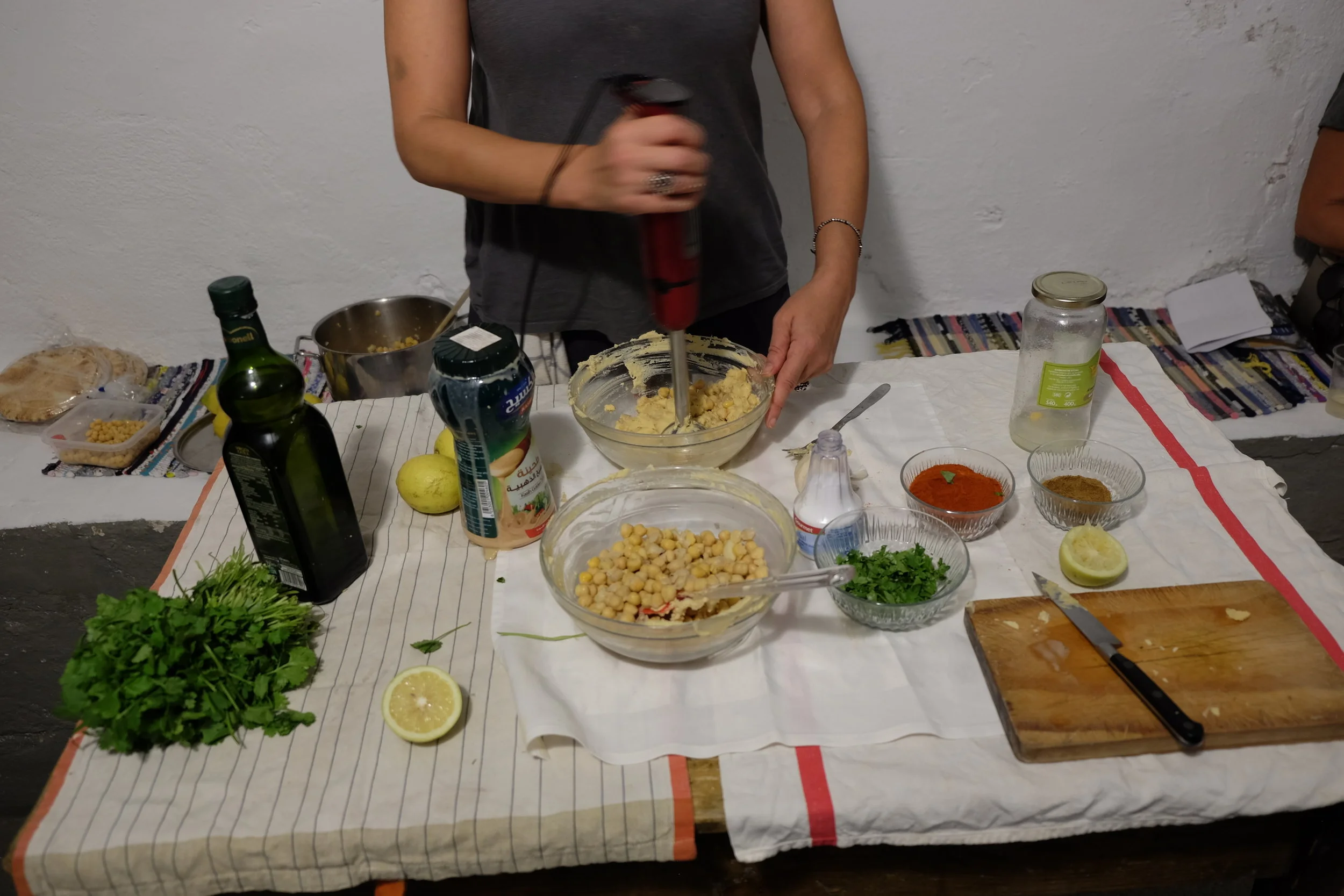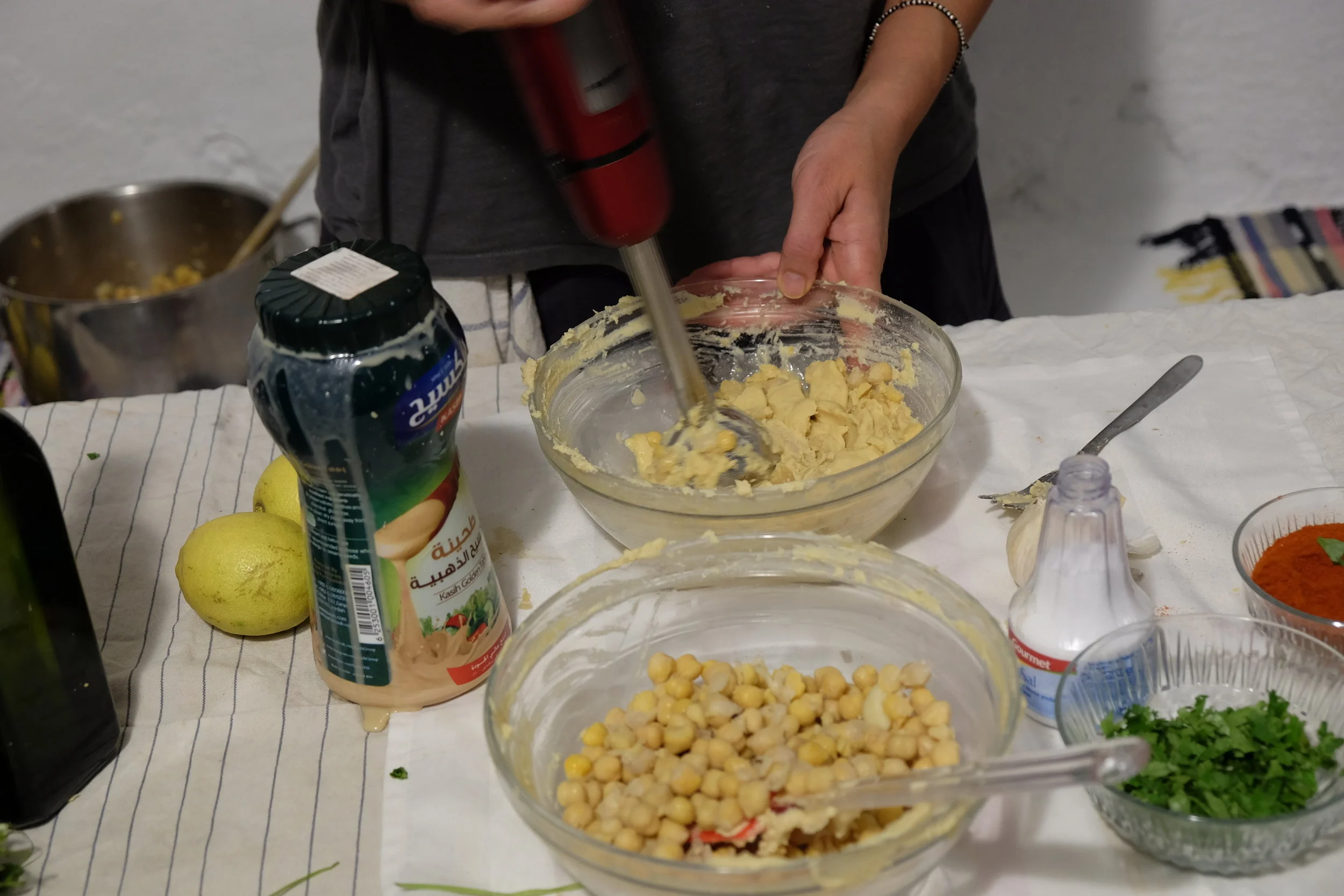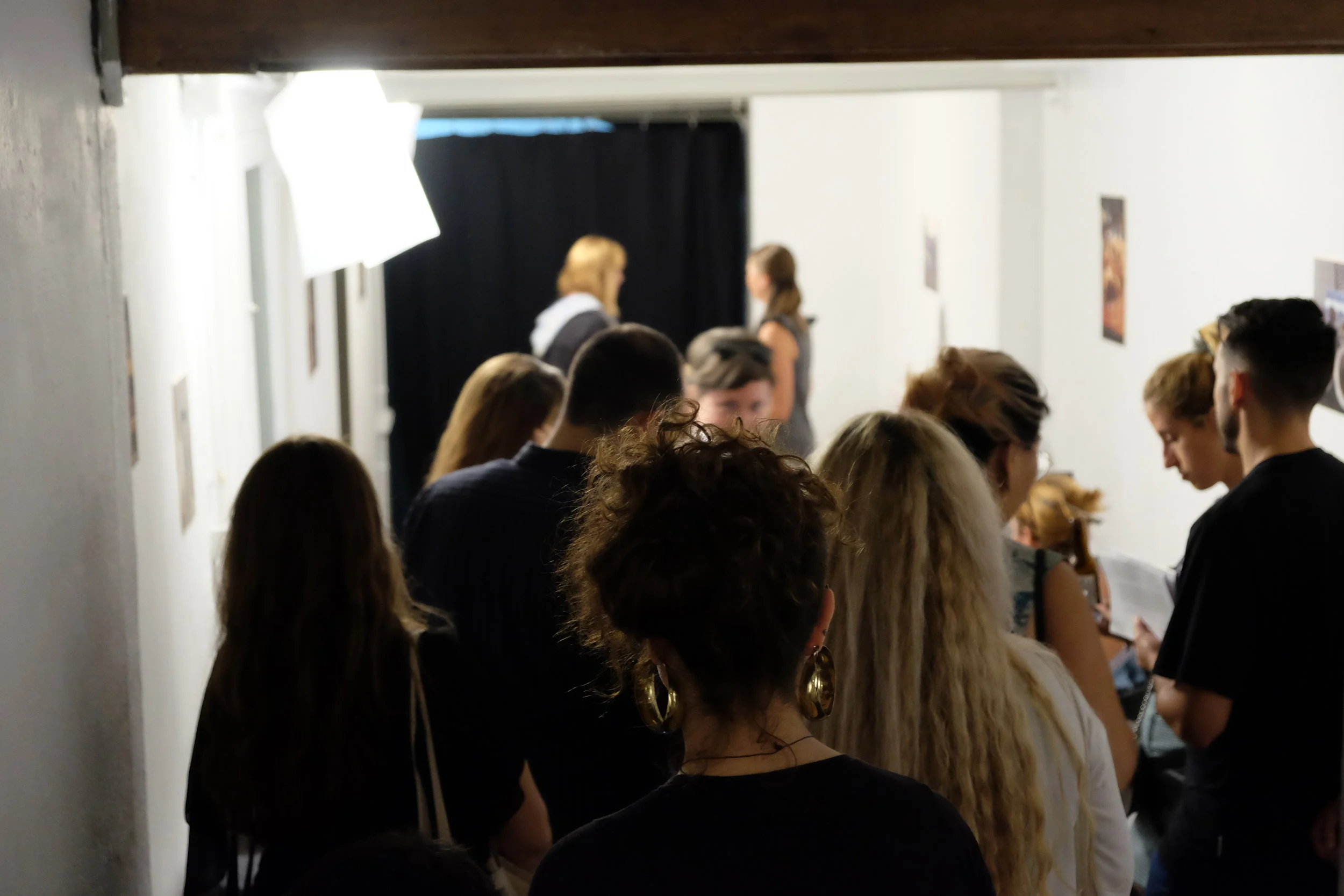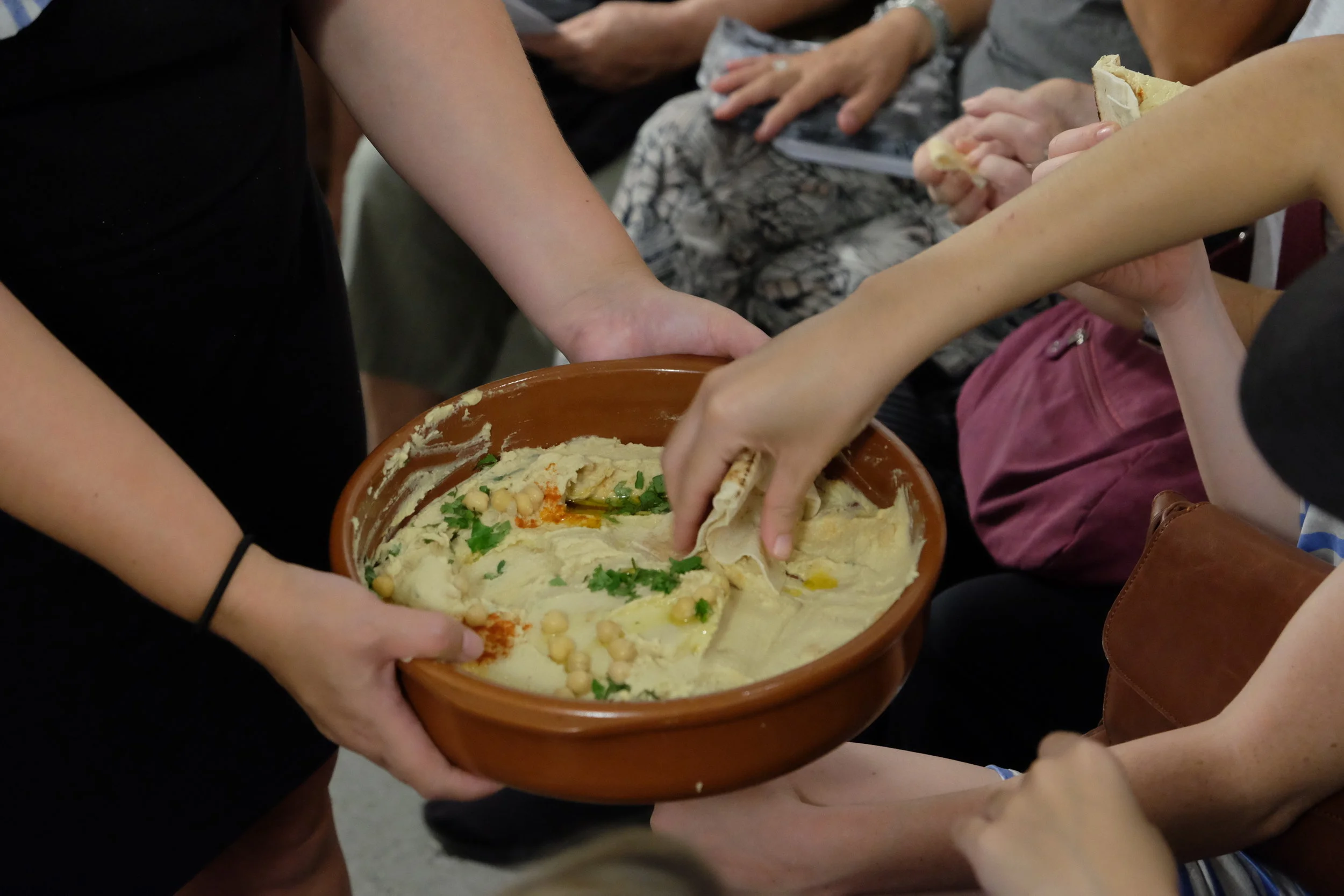Hummus - Sophie Heydel
Hummus is a performance by Sophie Heydel, assisted by Tsering Frykman-Glen. It came out of the many conversations between the two regarding Sophie and her family's histories, and is a part of the In Search of Lost Time exhibition.
It was performed in Bien Cuadrado Gallery on September 29th 2018.
One never really knows where these things lead, it led us to hummus. You can read Sophie and Tsering's texts below.
Time Found Again - Sophie Heydel.
It is as necessary that we realise a past out of which to grow as it is to realise a present and future into which to grow. Our past we have always with us. Our past we must always re-realise (...) One cycle finished we can drop or rise to another level - John Moriarty, writer and philosopher.
I grew up in North London, my father was Polish and my mother French and Scottish. When I began to visit other friend’s houses, I learnt that our home did not feel English. I have always had a sensation of not quite belonging to any particular culture, which for many years made me feel displaced. There was always a nagging desire to find my place in this world.
In Jan 1984, 6 months after my father died, I found myself needing to ‘escape’ home. I was 17 years old, and found myself heading to Jerusalem. For 6 months I lived and worked in the Fiasal Youth Hostel just outside the Damascus Gate, the Muslim quarter of East Jerusalem. In lieu of free accommodation I cleaned the hostel and dealt with guests, I had no room of my own but a mattress on the kitchen floor.
Israeli soldiers patrolled the streets with their Uzi sub-machine guns and, due to the on going Lebanese war, jet fighter planes would fly over daily. Breaking the sound barrier, the windows would rattle and my heart would leap into my throat. It was a far cry from leafy North London but despite the violence and anger in Jerusalem, ironically I felt ‘at home’ - perhaps due to the fact that everyone was trying to find their home.
One of my daily responsibilities was to get breakfast. Each morning I would go with a large enamel dish through the Damascus gate into the old city, through the labyrinth of ancient narrow streets until I arrived at what was then a hole in the wall and join the long morning queue until my turn. There, the dish was snatched quickly from my hands and fresh hummus was ladled in, and with a quick movement of the wrist, a decreasing spiral of lemon juice and olive oil was poured on top.
Jerusalem was volatile, aggressive, and yet had an incredible beauty that would unexpectedly offer brief periods of great calm and serenity. One of those moments came to me one night on my mattress in kitchen. Unable to sleep, I heard the 4am early morning call to prayer from the muezzins. It was that strange time between night and the break of a new day, and very faintly I heard another sound I could not identify. As the sound came and went I realised it was the sound of praying from the wailing wall. For a moment the Arabic and Hebrew prayers harmonised and sung together.
The human rights activist Rabi Arik Asherman said "To live in Jerusalem, you have to have a shield of sorts. And if the shield is nonexistent or too thin, you are not going to make it, you are going to go to pieces. And if it is too thick you will lose your soul." After 6 months of living in East Jerusalem I felt in danger of losing my soul and realised it was time to leave. I continued my travels and finally returned to North London a year later.
In 1997, my father’s sister died where she had lived in Mallorca. I went to clean out her house and found a suitcase full of letters written from my father during the Second World War to his parents. There were also many black and white photos and refugee passes. The refugee passes of my Grandparents and two Aunts are dated 1942 – 1948, place of residence Katamon, Jerusalem. A story began to unravel.
Through reading my fathers letters I learnt of my family's story of forced escape from Poland, due to being landowners, and the Soviet invasion in Sept 1939. The letters between family revealed a constant longing to return home, their memories of life in Poland had frozen in time. And with it, their difficulty to let go of a past that failed to exist. I began to understand their displacement and my own were inherently linked.
In May 2018, 34 years later, I returned to Jerusalem to retrace my own footsteps and those of my Grandparents. The Fiasal Hostel is still in operation but is now larger, renovated and renamed The Palm Hostel. I tried to find the kitchen where I used to sleep but there is no kitchen, just a transitional space, a corridor with stairs to an upper floor that is yet to be built. Only by looking out of the window at the unchanged view did I know this was the kitchen where I had heard both Muslim and Jewish prayers in harmony.
The house in Katamon, Jerusalem, where my family lived does not exist anymore, and the photo of them outside that house is also strangely missing from my collection of family photos.
I didn’t find the hole in the wall where I used to collect the hummus, I tried to remember the way but just kept coming to dead ends cut off with barbed wire.
I did not find time found again.
Hummus Crisis - Tsering Frykman-Glen.
I am British and like most British people, I am fond of hummus.
Hummus is rooted in my childhood alongside other foods made of legumes. Growing up in a hippie household my siblings and I were constantly being fed foods that we didn't like. Our parents and their friends would often have pots of lentils or chickpeas soaking in their kitchens, which most often meant bland curries or soups or often overly garlicky hummus.
At parties guests would bring bowls of guacamole, dhal, salads made of cous cous or tofu, and invariably hummus. The foods they prepared were not really a way of sharing their experiences of the places they had travelled to, but in fact a way to display their worldliness - often a kind of passive aggressive culinary one upmanship. No matter, we were not impressed, all us kids really wanted were bacon sandwiches, packets of crisps and sugary drinks.
As I grew up, my parents became more middle class and hummus began to appear in supermarkets and soon the pre-packaged tubs could be found in our fridge at home. Hummus had transitioned from being something made by fusty men and women talking about staying on a kibbutz to something bought at a "deli" counter.
Today, the UK spends approximately £60 million a year on hummus and more than 40% of British homes have a pot of hummus in their fridge, twice as much as any other European country. It has become pre-packed grocery staple.
So, when in April 2017 several of the UK's biggest supermarkets took hummus off their shelves due to "production issues", the minor outcry - that would come to be known as the Hummus Crisis of 2017 - was inevitable. If this is news to you, I encourage you to do an internet search using the hashtags #hummuscrisis or #hummusgate, you will find many fluff news articles mocking the "hummus-eating-middle-classes", many ''beat the hummus crisis'' recipes from online food bloggers but only a few upset hummus wanting consumers.
It has since transpired that the bulk of hummus in the UK is produced by an Icelandic company with 30 facilities dotted around the UK - the one that experienced the problem is based just off the Hanger Lane gyratory in West London. That's right, an Icelandic company based in Ealing, all very far from the Middle East and the origins of hummus al tahina.
This company produces large quantities of hummus for a broad range of supermarkets, covering both the low and high end markets, which was a rude awakening to all those brand-loyal customers who had always insisted that their supermarket hummus was superior tasting to others.
As it turns out, they were founded 30 years ago, around the time my mum started buying hummus at the supermarket and the time I started liking it, coincidence? I don't think so. As the teenage child of an alternative family that just wanted so much to be "normal'', the realisation that people other than hippies liked hummus allowed me to appreciate it.
These days I very rarely buy hummus, I have been making my own for some years.
I also like lentils.























